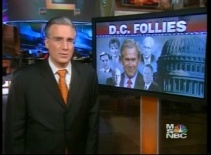In her first BRAD BLOG Guest Editorial, the 'Gag Ordered' FBI Translator Cites 'Patriotic Duty' of America's Intelligence Officials to Make Themselves Available for Congressional Testimony, Oversight
Appeals to them to contact her newly formed 'National Security Whistleblowers Coalition'
 Guest Blogged by Sibel Edmonds & William Weaver
Guest Blogged by Sibel Edmonds & William Weaver
ED. NOTE: FBI whistleblower, Sibel Edmonds' story has been partially told over the last several years in several different media outlets, including a lead story on CBS' 60 Minutes and more recently, a detailed feature in Vanity Fair. The information she has been able to reveal publicly about her experience during her time translating for the FBI has so far been limited given the arcane "States Secrets" privilege that the Dept. of Justice and the Bush Administration has invoked to effectively place a "gag order" on the information she has shared with internal FBI investigators as well as the Dept. of Justice's Inspector General who found her allegations "credible" and "serious" and "warrant[ing] a thorough and careful review by the FBI." Edmonds was fired by the FBI after voicing allegations including those about possible espionage inside the bureau. She has also testified to the 9/11 Commission, U.S. Senators Grassley (R-IA) and Leahy (D-VT) and many other officials on both the Senate Judiciary and Intelligence Committees. Her case recently made its way to the Supreme Court who refused to hear it on November 28, 2005, thus ending her legal options to have her case heard publicly. More info on her and her co-writer William Weaver follows her editorial below.
Without whistleblowers the public would never know of the many abuses of constitutional rights by the government. Whistleblowers, Truth Tellers, are responsible for the disclosure that President George W. Bush ordered unconstitutional surveillance of American citizens. These constitutional lifeguards take their patriotic oaths to heart and soul: Rather than complying with classification and secrecy orders designed to protect officials engaging in criminal conduct, whistleblowers chose to risk their livelihoods and the wrath of their agencies to get the truth out. But will they be listened to by those who are charged with accountability?
The Whistleblowers Law of Congressional Hearings holds that the higher ranking the official who testifies the less the likelihood that the truth will be revealed. With this in mind, it is impossible to proceed to the viscera of what happened to whom and when without asking those who are charged with putting policy decisions into the actual stream of practice. High officials have perverse incentives to hide what is done in their orders by the employees below them. It is indispensable that Congress reach deep inside the National Security Agency and other agencies, seeking out employees at the operational level to determine how the President's illegal order was carried into action. To assure that this occurs, we need for people with information from the agencies involved to come forward and ask to be interviewed by Congress. The National Security Whistleblowers Coalition calls on people with knowledge of unconstitutional surveillance of American citizens to contact NSWBC and let us know that they are willing to provide congress with information and testimony. Anonymity, if desired, will be scrupulously honored. NSWBC will provide contact information to Congress and investigative authorities, and will follow up to ensure that these witnesses were in fact interviewed in good faith by congressional staff and committees and allowed to participate in the hearing process. NSWBC will be the conduit between agents and Congress for those like Russ Tice, a former intelligence agent at the National Security Agency, who announced his willingness to disclose to Congress illegal acts by officials at his former employer. At NSWBC we know what we are asking people to do: Our organization is made up exclusively of veteran intelligence and law enforcement officers, agents and analysts.
Now is the time to come forward, not to reveal legitimately classified information, but to make yourselves available as witnesses and to serve the true supervisor of us all: the Constitution. Ordinarily one would expect the congress to be the guardian of our freedom by living up to its storied role as a check and balance to the President and the Executive Branch. But for four years, members of our Congress in supposed oversight committees were aware of illegal spying on American citizens. Co-opted by an unscrupulous commitment to secrecy and the state, intelligence oversight committees in Congress must step out of the way for a People's hearing on the matter of presidentially ordered illegal surveillance. Congress must engage in a broad, public hearing of these matters.
Accountability, in the end, always comes down to the public's right to know, the right to have the most basic knowledge about what its servants are doing with its money and its authority. Ambassador Maxwell Taylor, when asked what he thought about the public's right to know of what the government is doing on its behalf, infamously responded the he did not "believe in that as a general rule." Fortunately, that is not a general rule that comports with our system of government. Citizens cannot make informed choices if they do not have the facts. Public servants should not be forced to choose between career and conscience, between commitment to oath and commitment to colleagues, and if we live by our words, laws, and principles they will not have to. Protecting all employees of the People are that:
- Their higher loyalty is to the Constitution and the rule of law;
- Information may never be classified as secret merely because it is embarrassing or incriminating, or to cover up criminal and unlawful conduct;
- There is no agreement that public servants may sign that will require them lie to the Congress or courts;
- The United States' Code of Ethics for Government Service explains carefully and clearly in an assured voice that "Any person in government service should put loyalty to the highest moral principles and to the Country above loyalty to persons, party, or Government department."
Contact: Sibel Edmonds-Director, National Security Whistleblowers Coalition, sedmonds@nswbc.org
Sibel Edmonds, NSWBC Founder & President, sedmonds@nswbc.org
Sibel Edmonds, a former FBI language specialist, was terminated from the bureau after reporting security breaches, cover-up, and blocking of intelligence with national security implications. Since that time, court proceedings in her whistleblower case have been blocked by the imposition of "State Secret Privilege," and Congress has been prevented from discussion of her case through retroactive reclassification by the Department of Justice. Edmonds, fluent in Turkish, Farsi and Azerbaijani; holds an MA in Public Policy and International Commerce from George Mason University, and a BA in Criminal Justice and Psychology from George Washington University.
Professor William Weaver, NSWBC Senior Advisor, wweaver@nswbc.org
Bill Weaver served in U.S. Army signals intelligence for eight years in Berlin and Augsburg, Germany, in the late 1970s and 1980s. He holds a law degree and Ph.D. in politics from the University of Virginia. He currently is an associate professor and associate director of faculty for the Institute for Policy and Economic Development and an Associate in the Center for Law and Border Studies at the University of Texas at El Paso. He specializes in executive branch secrecy policy, governmental abuse, and law and bureaucracy.
About National Security Whistleblowers Coalition
National Security Whistleblowers Coalition (NSWBC), founded in August 2004, is an independent and nonpartisan alliance of whistleblowers who have come forward to address our nation's security weaknesses; to inform authorities of security vulnerabilities in our intelligence agencies, at nuclear power plants and weapon facilities, in airports, and at our nation's borders and ports; to uncover government waste, fraud, abuse, and in some cases criminal conduct. The NSWBC is dedicated to aiding national security whistleblowers through a variety of methods, including advocacy of governmental and legal reform, educating the public concerning whistleblowing activity, provision of comfort and fellowship to national security whistleblowers suffering retaliation and other harms, and working with other public interest organizations to affect goals defined in the NSWBC mission statement. For more on NSWBC visit www.nswbc.org
 The "DVN Top 5" is a feature in the weekly voting newsletter of VoteTrustUSA. The December 26 edition can be found here. The selection of what will be the "Top 5" for each week and where it goes on the list is all mine. The fact that you may disagree with my choices is great because it shows that you have been reading the DVN articles that I've posted throughout the week here on The BRAD BLOG!...
The "DVN Top 5" is a feature in the weekly voting newsletter of VoteTrustUSA. The December 26 edition can be found here. The selection of what will be the "Top 5" for each week and where it goes on the list is all mine. The fact that you may disagree with my choices is great because it shows that you have been reading the DVN articles that I've posted throughout the week here on The BRAD BLOG!...

 Sunday 'Your Choice' Toons
Sunday 'Your Choice' Toons The GOP 'Voter Fraud'
The GOP 'Voter Fraud' 'Green News Report' 10/31/24
'Green News Report' 10/31/24
 'Closing Arguments'with Digby and Driftglass: 'BradCast' 10/30/24
'Closing Arguments'with Digby and Driftglass: 'BradCast' 10/30/24 Trump Promises to be a Lawless, Authoritarian President. Believe Him: 'BradCast' 10/29/24
Trump Promises to be a Lawless, Authoritarian President. Believe Him: 'BradCast' 10/29/24 'Green News Report' 10/29/24
'Green News Report' 10/29/24 Ballots Burn, Billionaires 'Obey in Advance', Callers Ring In: 'BradCast' 10/28/24
Ballots Burn, Billionaires 'Obey in Advance', Callers Ring In: 'BradCast' 10/28/24 Musk's Privatized Internet Satellite System Threatens U.S. National Security
Musk's Privatized Internet Satellite System Threatens U.S. National Security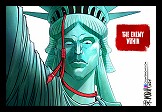 Sunday 'VOTE NOW!' Toons
Sunday 'VOTE NOW!' Toons 'Green News Report' 10/24/24
'Green News Report' 10/24/24 Harris on Hope, Trump's Fasc-ism in Bumpy Closing Days: 'BradCast' 10/24/24
Harris on Hope, Trump's Fasc-ism in Bumpy Closing Days: 'BradCast' 10/24/24 Kelly: Trump 'Fascist', Admires Hitler, Disrespects Law: 'BradCast' 10/23/24
Kelly: Trump 'Fascist', Admires Hitler, Disrespects Law: 'BradCast' 10/23/24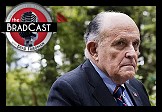 Accountability Comes For Rudy, Other Election Deniers: 'BradCast' 10/22/24
Accountability Comes For Rudy, Other Election Deniers: 'BradCast' 10/22/24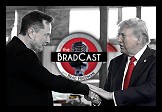 Elon Musk's 'Vote Buying' and Lying for Trump: 'BradCast' 10/21/24
Elon Musk's 'Vote Buying' and Lying for Trump: 'BradCast' 10/21/24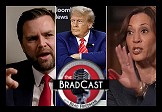 Fake v. Real Censorship and Trump/Fox Fetish-ized Grievance World: 'BradCast' 10/17/24
Fake v. Real Censorship and Trump/Fox Fetish-ized Grievance World: 'BradCast' 10/17/24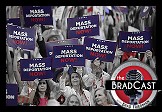 'Americans Aren't Prepared for Trump's Police State': 'BradCast' 10/16/24
'Americans Aren't Prepared for Trump's Police State': 'BradCast' 10/16/24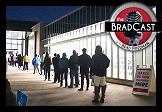 Good News for Georgia Voters, the Economy and Kamala Harris: 'BradCast' 10/15/24
Good News for Georgia Voters, the Economy and Kamala Harris: 'BradCast' 10/15/24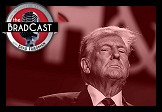 Fascism Comes to America: 'BradCast' 10/14/24
Fascism Comes to America: 'BradCast' 10/14/24
 VA GOP VOTER REG FRAUDSTER OFF HOOK
VA GOP VOTER REG FRAUDSTER OFF HOOK Criminal GOP Voter Registration Fraud Probe Expanding in VA
Criminal GOP Voter Registration Fraud Probe Expanding in VA DOJ PROBE SOUGHT AFTER VA ARREST
DOJ PROBE SOUGHT AFTER VA ARREST Arrest in VA: GOP Voter Reg Scandal Widens
Arrest in VA: GOP Voter Reg Scandal Widens ALL TOGETHER: ROVE, SPROUL, KOCHS, RNC
ALL TOGETHER: ROVE, SPROUL, KOCHS, RNC LATimes: RNC's 'Fired' Sproul Working for Repubs in 'as Many as 30 States'
LATimes: RNC's 'Fired' Sproul Working for Repubs in 'as Many as 30 States' 'Fired' Sproul Group 'Cloned', Still Working for Republicans in At Least 10 States
'Fired' Sproul Group 'Cloned', Still Working for Republicans in At Least 10 States FINALLY: FOX ON GOP REG FRAUD SCANDAL
FINALLY: FOX ON GOP REG FRAUD SCANDAL COLORADO FOLLOWS FLORIDA WITH GOP CRIMINAL INVESTIGATION
COLORADO FOLLOWS FLORIDA WITH GOP CRIMINAL INVESTIGATION CRIMINAL PROBE LAUNCHED INTO GOP VOTER REGISTRATION FRAUD SCANDAL IN FL
CRIMINAL PROBE LAUNCHED INTO GOP VOTER REGISTRATION FRAUD SCANDAL IN FL Brad Breaks PA Photo ID & GOP Registration Fraud Scandal News on Hartmann TV
Brad Breaks PA Photo ID & GOP Registration Fraud Scandal News on Hartmann TV  CAUGHT ON TAPE: COORDINATED NATIONWIDE GOP VOTER REG SCAM
CAUGHT ON TAPE: COORDINATED NATIONWIDE GOP VOTER REG SCAM CRIMINAL ELECTION FRAUD COMPLAINT FILED AGAINST GOP 'FRAUD' FIRM
CRIMINAL ELECTION FRAUD COMPLAINT FILED AGAINST GOP 'FRAUD' FIRM RICK SCOTT GETS ROLLED IN GOP REGISTRATION FRAUD SCANDAL
RICK SCOTT GETS ROLLED IN GOP REGISTRATION FRAUD SCANDAL VIDEO: Brad Breaks GOP Reg Fraud Scandal on Hartmann TV
VIDEO: Brad Breaks GOP Reg Fraud Scandal on Hartmann TV RNC FIRES NATIONAL VOTER REGISTRATION FIRM FOR FRAUD
RNC FIRES NATIONAL VOTER REGISTRATION FIRM FOR FRAUD EXCLUSIVE: Intvw w/ FL Official Who First Discovered GOP Reg Fraud
EXCLUSIVE: Intvw w/ FL Official Who First Discovered GOP Reg Fraud GOP REGISTRATION FRAUD FOUND IN FL
GOP REGISTRATION FRAUD FOUND IN FL





















